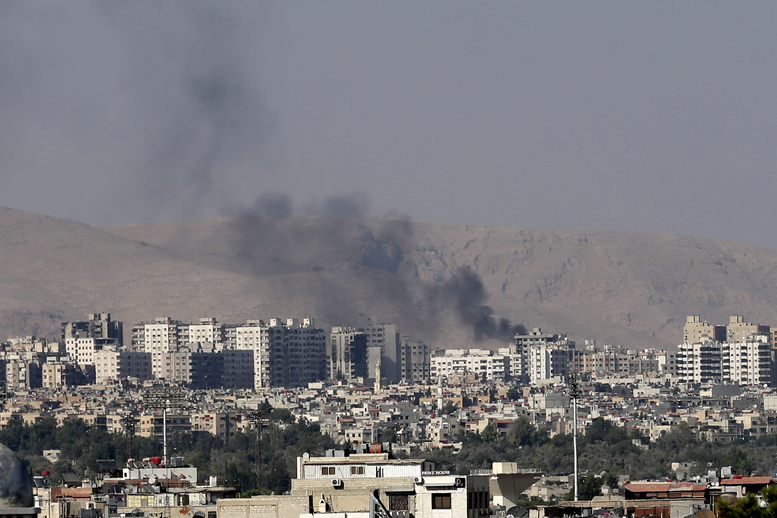BEIRUT — Russia on Friday added its diplomatic weight to demands for a swift probe into an alleged chemical weapons attack that has injected new vigor into calls for international military action in Syria’s civil war.
The U.S., Britain, France and other countries have pressed for a team of United Nations inspectors already in Syria to be granted immediate access to the sites of Wednesday’s purported gas attack that activists say killed more than 130 people. In an attempt to push things along, U.N. Secretary-General Ban Ki-moon is dispatching his disarmament chief to Damascus to press President Bashar Assad’s regime to agree to an investigation.
Timing is vital, experts say, because the more time passes, the harder it is to detect what chemicals – if any – were used. Immediate access also would allow inspectors to collect blood and soil samples themselves and safeguard the chain of custody of and the integrity of the investigation.
But in the chaos and violence of Syria’s civil war, safe passage to the eastern Damascus suburbs in question would be difficult.
That was made clear on Friday, as government artillery on the Qassioun plateau overlooking Damascus pounded those suburbs in the heaviest strikes in days. Booms from the artillery echoed over the city every few minutes, along with several rounds of rocket fire that raised flashes of light from the suburbs. At times, three or four plumes of smoke could be seen billowing on the horizon.
Syrian opposition figures and activists have reported death tolls from Wednesday’s attack ranging from 136 to 1,300. If confirmed, even the most conservative tally would make it the deadliest alleged chemical attack in Syria’s civil war. The Assad regime has denied the allegations, calling them “absolutely baseless” and accusing the opposition of staging the whole affair to smear the government and provoke outside intervention.
Russia, which is a close ally of Damascus and its most powerful protector on the international stage, also has suggested the opposition staged the attack to discredit the regime. But on Friday, Moscow also called on both sides of the conflict to facilitate an investigation.
“Russia immediately contacted the Syrian government asking them to cooperate with U.N. experts,” the Foreign Ministry in Moscow said in a statement. “It is now a matter for the opposition, which should guarantee safe access of the mission to the supposed location of the incident.”
In Istanbul, Syria’s main Western-backed opposition group, the Syrian National Coalition, insisted it could guarantee the inspectors’ safety in the territory it holds.
The rebels hope the purported chemical attack will be a watershed moment, jolting Western powers into action in a conflict that has killed more than 100,000 people.
In this line of thinking, previous purported uses of chemical weapons were too small to make a difference, while Wednesday’s casualty toll, even if the lowest number is verified, will be far harder to ignore.
That, coupled with the shocking images of dead children and survivors gasping for breath, has introduced a new dynamic into the debate about how the international community should respond.
France’s foreign minister on Thursday raised the possibility of the use of force if Assad’s regime was proven to have used chemical weapons, while Turkey said several red lines have been crossed.
In an interview with CNN broadcast Friday, President Barack Obama called it a “big event of grave concern,” adding that it was “very troublesome” and had accelerated the time frame for determining a U.S. response.
“This is something that is going to require America’s attention,” he said.
More than a year ago, Obama warned that the use of chemical weapons in Syria would be a “red line” for the U.S. and carry “enormous consequences.” Washington then said in June that it had conclusive evidence that the Assad regime had used chemical weapons against opposition forces, prompting a U.S. decision to begin arming rebel groups, although that has not happened yet.
While the U.S. is providing humanitarian support and financial aid to the opposition, the Obama administration has made clear its reluctance to get directly involved militarily in the conflict.
The U.N. team has been in Damascus since Sunday to investigate three sites where past chemical weapons attacks allegedly occurred: the village of Khan al-Assal just west of the embattled northern city of Aleppo and two other locations kept secret for security reasons.
It took months of negotiations between the U.N. and the Syrian government to agree on the limited mandate of the probe.
Deputy Prime Minister Qadri Jamil told The Associated Press on Thursday he was personally in favor of a fair, transparent international delegation to investigate the most recent incident. But he said that would require a new agreement between the government and the U.N. and that the conditions for such a delegation would need to be studied.
Send questions/comments to the editors.



Success. Please wait for the page to reload. If the page does not reload within 5 seconds, please refresh the page.
Enter your email and password to access comments.
Hi, to comment on stories you must . This profile is in addition to your subscription and website login.
Already have a commenting profile? .
Invalid username/password.
Please check your email to confirm and complete your registration.
Only subscribers are eligible to post comments. Please subscribe or login first for digital access. Here’s why.
Use the form below to reset your password. When you've submitted your account email, we will send an email with a reset code.